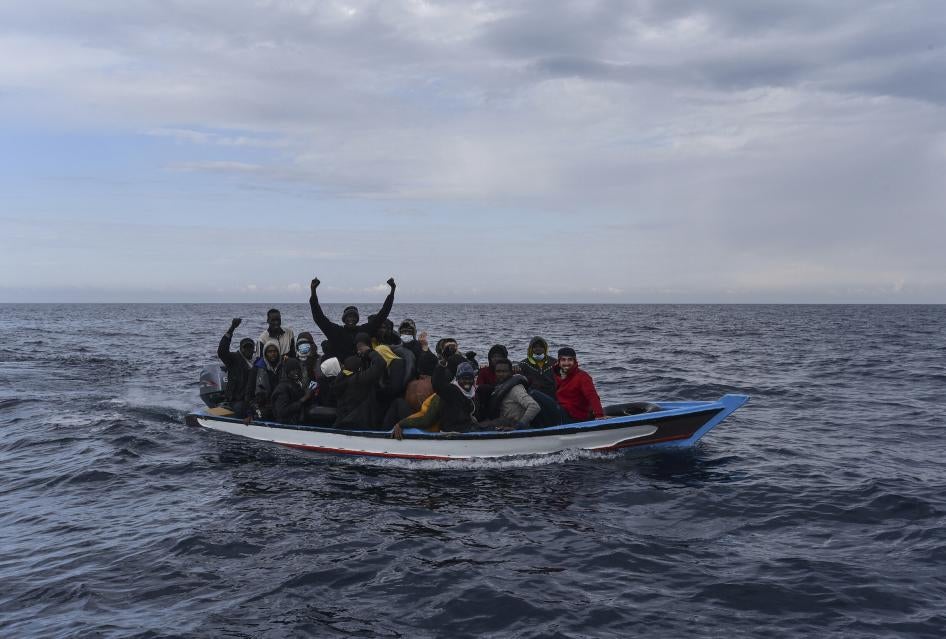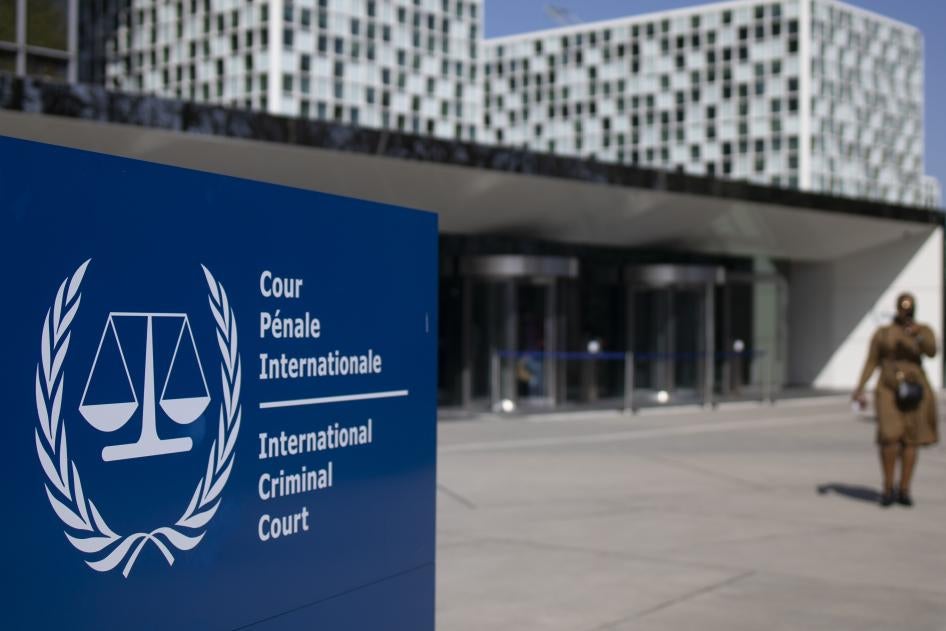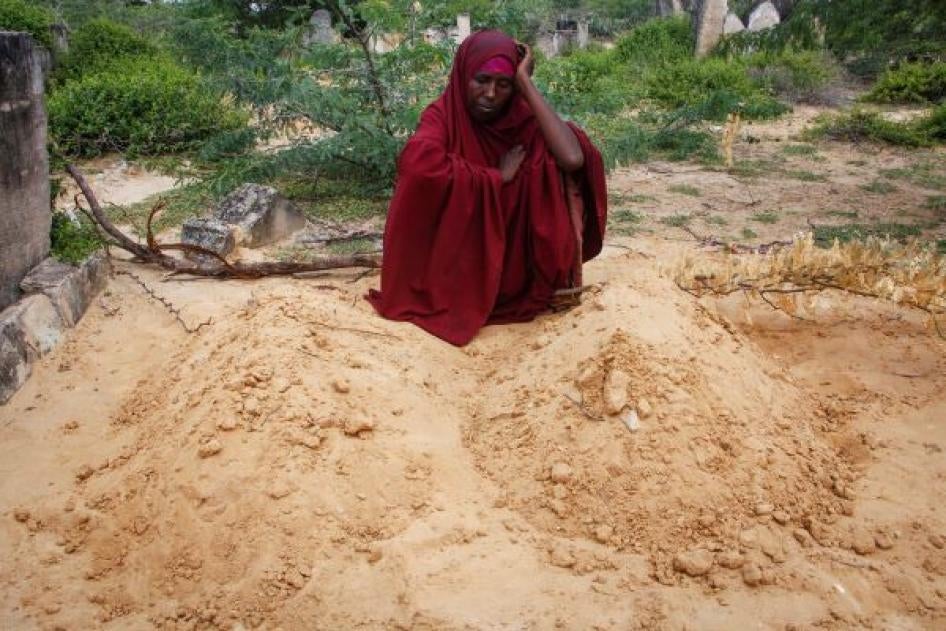Europe’s “Let Them Die” Policy: Daily Brief
- Children Dying on the Mediterranean;
- Justice Delayed in Afghanistan;
- Heed Famine Warning in Somalia;
- Take Note;
- Quote of the Day: Xinjiang;
- Reader Question: Top Human Rights Quotes?
By Andrew Stroehlein. Contact me at DailyBriefTeam@hrw.org and Twitter @astroehlein.
Europe’s “Let Them Die” Policy
Her name was Loujin. She was four years old. She died adrift at sea because of deliberate European policy.
Yes, deliberate. The European Union has thought about its approach towards people desperately trying to reach the safety of its Mediterranean shores. They have deliberated – discussed carefully at long length – and have opted for a policy of, as my colleague Jude Sunderland puts it, “deterrence by drowning and dehydration.”
Specifically, they’ve decided that EU ships should not actively patrol anywhere near where most boats fall into distress. They’ve decided that Frontex, the EU’s border and coast guard, conducts aerial surveillance in service of interceptions and returns, not rescues.
They’ve decided that four-year-old girls will die.
The hope of EU policy makers – if such twisted intentions can be called “hope” – is that their inhumanity will send a “tough signal” that stops people getting into the boats. As if innocent lives can be sacrificed to send a political message…
And it doesn’t work anyway. People are not deterred by the EU’s callous signaling. Driven by desperation, they keep coming – and keep dying.
More than 1,200 people have died in the Mediterranean Sea in 2022, adding to the almost unimaginable tally of nearly 25,000 deaths since 2014.
Syrian children have been among the latest victims. Last week, it was Loujin, who set off from Lebanon. This week saw three kids – ages 1, 2, and 12 – perishing on a journey from Turkey.
None of this has to happen. This is happening by choice. A policy choice.
In abdicating their responsibility to ensure search and rescue in the Mediterranean, EU policy makers are not ignorant fools. They’re educated people who know what they’re doing and who know the horrific consequences of their actions.
We don’t have to convince them that deaths like Loujin’s are happening because of their policy. Much more disturbingly, we have to convince them that it’s wrong.
Justice Delayed in Afghanistan
While the number of grave international crimes in Afghanistan only increases, the pursuit of international justice seems stalled.
The current reason for the hold-up is the delay of a critical ruling from the International Criminal Court (ICC). The story is somewhat complicated…
Deep breath…
In March 2020, following years of preliminary inquiry, ICC judges authorized the ICC Office of the Prosecutor to begin an investigation in Afghanistan. However, the then Afghan government asked the ICC defer to their national investigations.
After the Taliban’s takeover in August 2021, the current prosecutor, Karim Khan, wasted no time. In September 2021, he asked the court’s judges to resume the ICC investigation.
However, nearly a year later, the judges have yet to address the merits of whether an investigation should go forward.
On August 26, Khan filed his latest submission in favor of launching an investigation, arguing the Taliban, “are not continuing, cannot continue and will not continue” relevant national justice efforts.
Throughout the delays, one simple fact remains: serious abuses are still happening, some of which may amount to crimes within the ICC’s jurisdiction.
The ICC prosecutor first began considering cases in Afghanistan 16 years ago. How much longer will Afghans have to wait for justice?
Heed Famine Warning in Somalia
All the alarm bells are ringing in the international aid world right now, as famine is forecast for parts of Somalia.
The new analysis from the Integrated Food Security Classification System (IPC), the respected multi-partner monitoring project, predicts “level 4 - critical” for much of the country and “level 5 – very critical” for at least one region.
Under the IPC system, it doesn’t get worse than level 5. It would mean: “Households have an extreme lack of food and/or other basic needs even after full employment of coping strategies. Starvation, death, destitution and extremely critical acute malnutrition levels are evident.”
The hope is that the international community hears this warning and responds in time.
In 2011, Somalia suffered a similar crisis, and in part because aid was slow to come, some 300,000 people died.
As development expert Hodan Ali pointed out in The New Humanitarian this week, lamenting the slow response, that’s about the population of Geneva.
“Just think what would happen if an entire European city died of hunger: I guarantee you, things would change – and fast.”
(The spark for this story came from a Daily Brief reader. Please email me or contact me on Twitter with your suggestions.)
________________________________________________
Take Note
(curated today by Lisa Maier)
- Living without rights should not be normalized in El Salvador. (Tamara Taraciuk for el faro)
- China: 500,000 people prosecuted and imprisoned during brutal Xinjiang crackdown, official figures reveal (HRW)
- Leading environmentalists decry crackdown on Vietnam climate activists (The Guardian)
- Fossil fuel ban would save lives, a global health groups coalition says (DW)
- Saudi Arabia jails tribe members for 50 years for refusing to be displaced to make room for new megaproject (Middle East Eye)
- Upcoming elections: a vote for the future of Brazil (Der Spiegel, English)
________________________________________________
Quote of the Day: Xinjiang
"There should be no special treatment for powerful governments who commit the most serious human rights abuses."
Omer Kanat, Co-Founder & Executive Director, Uyghur Project, looking forward to action on Xinjiang from the new UN High Commissioner for Human Rights, Volker Türk
(see related story in Daily Brief from September 9)
________________________________________________
Reader Question: Top Human Rights Quotes?
What is your favorite human-rights-related quote of all time?
It could be from an activist or from a lawyer or from an artist… But it should be inspiring.
Let me know! Email me or contact me on Twitter with your favorites.
________________________________________________
Help promote human rights – forward this email to others & encourage them to sign up here.


